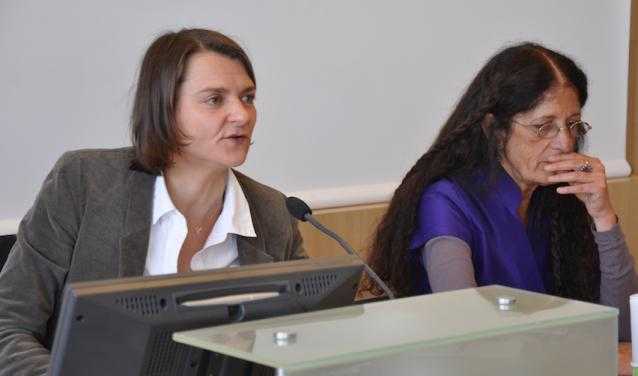Home>Social Sciences Through the Prism of Gender

03.02.2020
Social Sciences Through the Prism of Gender
PRESAGE, Sciences Po’s Research and Educational Programme on Gender Studies, was created in 2010. With the triple aim of promoting gender-related research, developing the university’s curriculum, and disseminating knowledge within the field, PRESAGE was among the first cross-cutting, interdisciplinary research programmes dedicated to gender studies in France. Meet its founders, Hélène Périvier et Françoise Milewski, both researchers at the Paris-based Observatoire français des conjonctures économiques (OFCE).
How did PRESAGE come in to being?
Hélène Périvier: The PRESAGE programme was born out of my first encounter with Françoise Milewski. We were both economists at the French Economic Observatory (OFCE), one of Sciences Po’s research centres, and we found that we had a shared interest in issues of gender equality, inequality, discrimination, and the whole concept of gender in general.
Françoise Milewski: In 2010 there were a few people at Sciences Po working on these themes but their research was not really visible to the wider public. That’s what made us want to create a multidisciplinary programme that could incorporate both teaching and research.
Hélène Périvier: The idea was to build bridges between research and public debate. Academic research on the subject is extremely rich – conceptually but also in terms of controversy – yet it doesn’t always seem to feed into public debate. That seemed a shame to us because, while each of us may have our own view on issues of gender equality, in reality it is a subject of eminent complexity.
How are gender studies perceived and taught at Sciences Po?
Hélène Périvier: The term ‘gender studies’ is often used to describe a fairly restricted field of research, which looks at issues of sexual identity, sexuality, and socially constructed identity. At Sciences Po we use the term much more broadly to incorporate the study and better understanding of the origins of gender inequality but also of discrimination of all kinds: discrimination on the basis of sexuality, appearance, sex, ethnicity, and so on. The approach to gender here is extremely varied and the axis of the social sciences has a clear impact: Sciences Po’s five key disciplines – history, sociology, political sciences, economy and law – are all brought to bear on the wider field of gender.
Françoise Milewski: What’s really important for us at PRESAGE is the interdisciplinary, cross-cutting approach, which is a question of outlook as much as procedure. The fact of gender studies having its place amongst the body of other research centres at Sciences Po generates exchange between disciplines and reinforces the scientific nature of the work that the centre produces.
10 years on since the creation of the programme, how do you feel about how far it has come?
Hélène Périvier: We’re pretty pleased. We have always been made to feel extremely welcome and our colleagues have contributed enthusiastically to the success of the programme. I could cite Bruno Perreau, now a professor at MIT, Janine Mossuz-Lavau, who was one of the first researchers at Sciences Po to work on themes of gender, and then, of course, the members of our steering committee: Marta Dominguez Folgueras, Réjane Sénac, Elissa Mailänder and Marie Mercat-Bruns.
We have also had the warm support of the philosopher of feminist thought Geneviève Fraisse, who has only taught once over the course of her academic career and chose to do that at Sciences Po. It was a very proud moment! We are also grateful to Françoise Héritier, who supported us a great deal and whose presence on the academic landscape is sorely missed.
Françoise Milewski: Our greatest satisfaction is to have championed interdisciplinarity in research and teaching and to have been able to develop teaching which remains open to the contradictions existing in the field. PRESAGE’s researchers have contributed to academic but also popular debates in relation to current affairs.
Hélène Périvier: We have just established an Advanced Certification in Gender Studies, which will allow Sciences Po graduates with a firm grounding in the field of gender studies to highlight that for potential employers or other institutions. Going forward, we hope to develop the range of courses on offer still further. We are also planning to devise a rolling programme of training courses on gender equality for people already in employment.
More information
Subscribe to News from Sciences Po